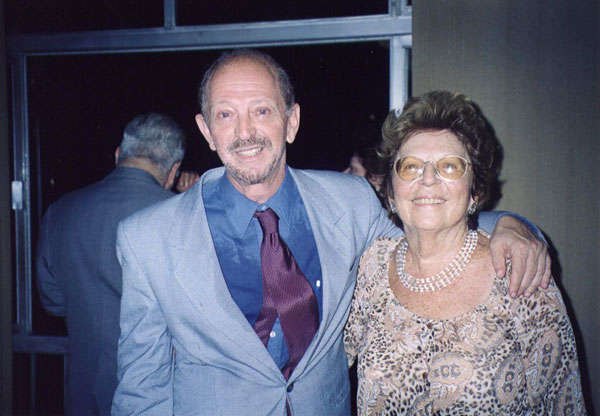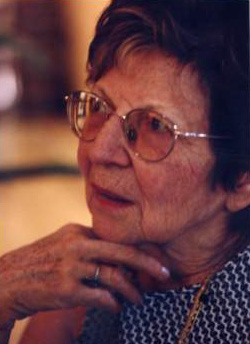vida

A falta que Bella Jozef nos faz
Não seria muito difícil falar sobre Bella Jozef, professora e crítica literária recentemente falecida no Rio de Janeiro. Basta entrar em um site de busca e as informações, abundantes, ali estão. Ficamos assim sabendo que era filha de imigrantes judeus russos, que nasceu no Rio a 29 de janeiro de 1926; que estudou na UFRJ tornando-se depois assistente de Manuel Bandeira, então professor da instituição, e que a estimulou a estudar a literatura hispano-americana. Bella assumiu, por concurso, a cátedra de Literatura Hispano-Americana; dirigiu o o departamento de Letras Neolatinas e orientou numerosas teses e dissertações. O seu relacionamento com escritores latino-americanos não se fazia apenas através dos textos, das resenhas; conheceu vários deles, e desta relação muitas vezes afetiva resultaram as entrevistas vívidas e reveladoras que aparecem em Diálogos oblíquos, em que conversa com Julio Cortázar, Jorge Luis Borges e Gabriel García Márquez entre outros.
Da sua bibliografia constam ainda obras como Poesia Argentina – 1940-1960; História da Literatura Hispano-Americana (1971), considerada obra fundamental; Espaço reconquistado (1974); O jogo mágico (1980) ensaio sobre a linguagem literária; A máscara e o enigma (1986) profundo estudo sobre a cindição latino-americana; Romance Hispano-Americano (1986). Coordenou a seção brasileira do fundamental Diccionario Enciclopédico de las letras de América Latina (1998) e organizou várias antologias, entre elas a importante Antología General de la Literatura Brasileña (1995), publicada no México, que muito contribuiu para divulgar o trabalho de nossos autores. E que, entre outras posições, foi membro do Conselho Editorial da Universidade Federal do Rio de Janeiro, fundadora e diretora cultural por seis mandatos da Associação de Professores de Espanhol do Rio de Janeiro (Apeerj); era professora emérita da UFRJ. Tudo isso dá uma idéia da magnitude e da importância de seu trabalho, mas o que nos diz de Bella Jozef, como pessoa?
Neste sentido, acho que posso dar uma pequena, e emocionada, contribuição. É que fui amigo da Bella. Apesar de morar em Porto Alegre encontrei-a várias vezes, no Rio, em outras cidades brasileiras e também no exterior, em eventos dedicados aquilo que, mais que seu campo de interesse constituia-se em verdadeiro fascínio pessoal: a literatura latino-americana. E nisto Bella preenchia uma lacuna importante. Com o boom dos anos sessenta e setenta os escritores do continente ganharam um destaque impressionante. Numa viagem que fiz pela Europa em 1970 surpreendeu-me ver nas vitrines das livrarias as obras de García Marquez, de Vargas Llosa, de Julio Cortazar. Era o reconhecimento de seus méritos, mas havia aí também um componente político: estávamos em pleno período ditatorial na América Latina e prestigiar esses escritores era uma forma de protestar contra o autoritarismo, o que tinha o apoio de editores, de livreiros, de jornalistas, de intelectuais, dos leitores em geral. Mas, e aí vem um fenômeno interessante: literatura latino-americana não incluía o Brasil. Havia como que uma barreira cultural que resultava, claro, da diferença de idiomas, mas não só disso; era como se o nosso país e a América Latina estivessem de costas, segundo uma expressão muito usada então. O realismo mágico, que caracterizava a literatura hispânica, não chegou a se desenvolver muito entre nós.
Foi neste contexto que o trabalho de Bella Jozef adquiriu uma dimensão transcendente. O esforço que fazia para difundir entre os brasileiros as obras de escritores hispânicos era comovente, para dizer o mínimo; e seu entusiasmo, nas palestras que dava, era contagiante. Pode-se dizer que ela foi, naquele momento, o elo de ligação entre as duas culturas, uma ligação que ela fazia com a autoridade de seu conhecimento e com a emoção de quem vive intensamente o seu trabalho. Os escritores que estudava fascinavam-na. Assim, sobre Borges, ela diz, numa conferência de 1999: “Ler Borges é uma das aventuras mais fascinantes da liberdade criadora. Após uma entrevista com ele, dei-me conta de uma poderosa lição de vida e de literatura que havia acabado de ouvir: ‘Os livros não são espelho do mundo mas uma coisa a mais acrescentada ao mundo’. Assim pode-se compreender melhor o lugar de Borges em todos os pequenos imaginários individuais e na história da cultura ocidental.”
 É claro que isso não resultava apenas de competência ou de conhecimento. Bella era uma pessoa especial, extremamente generosa e afetiva. Foi o que constatei quando, em 2003, instituições culturais do RS lançaram minha candidatura à Academia Brasileira de Letras. Devo dizer que eu não estava preparado para tanto; morando em Porto Alegre, eu conhecia muito pouco da ABL. Sabia que, de acordo com a tradição, deveria visitar os acadêmicos e apresentar-me a eles, o que exigiria várias e complexas providências. Neste momento Bella veio em meu socorro. Ela própria havia sido candidata a uma vaga, e, mesmo não tendo sido eleita, sabia o que fazer. Junto com Georges, organizou em seu próprio apartamento um encontro no qual pude falar com a maioria dos acadêmicos. Foi, muito mais que uma iniciativa prática, um ato de encorajamento, de solidariedade, que me valeu muitíssimo e que eu não pude deixar de lembrar quando, pouco tempo depois, fui eleito para ABL.
É claro que isso não resultava apenas de competência ou de conhecimento. Bella era uma pessoa especial, extremamente generosa e afetiva. Foi o que constatei quando, em 2003, instituições culturais do RS lançaram minha candidatura à Academia Brasileira de Letras. Devo dizer que eu não estava preparado para tanto; morando em Porto Alegre, eu conhecia muito pouco da ABL. Sabia que, de acordo com a tradição, deveria visitar os acadêmicos e apresentar-me a eles, o que exigiria várias e complexas providências. Neste momento Bella veio em meu socorro. Ela própria havia sido candidata a uma vaga, e, mesmo não tendo sido eleita, sabia o que fazer. Junto com Georges, organizou em seu próprio apartamento um encontro no qual pude falar com a maioria dos acadêmicos. Foi, muito mais que uma iniciativa prática, um ato de encorajamento, de solidariedade, que me valeu muitíssimo e que eu não pude deixar de lembrar quando, pouco tempo depois, fui eleito para ABL.
Assim era Bella Jozef, uma pessoa culta, dinâmica, generosa. Fará falta à sua família, fará falta aos amigos, fará falta ao Brasil.

Bella Jozef will be missed
Bella Jozef, Professor and literary critic was the daughter of Russian Jewish immigrants, born in Rio on January 29, 1926. She entered the Federal University of Rio de Janeiro at the age of 15 to study literature and later became assistant to the poet and Professor Manuel Bandeira, who encouraged her to study literature Hispanic American. Years later Bella took over the Chair of the Spanish-American Literature after a fiercely competitive application process. By this time she was well known through her publications, both in scientific and literary magazines as well as in national periodicals. Bella directed the department Neo-Latin Letters and over the next 50 years supervised numerous PhD theses and dissertations. Her relationship with Latin American writers did not take place through texts, and reviews only, as she met and develop friendships with several of them. These relationship often resulted in affective vivid and revealing interviews that appear in one of her books oblique dialogues, which describes conversation with Julio Cortazar, Jorge Luis Borges and Gabriel García Márquez and others.
The bibliography of her works continues in Poetry Argentina – 1940-1960, History of the Spanish-American Literature (1971), considered fundamental work; Regained Space (1974); The Magic Game (1980), an essay on the literary language; The Mask and the enigma (1986), a thorough study on theLatin American condition and, Hispanic-American Romance (1986). Bella coordinated the Brazilian section of the fundamental Diccionario de las Encyclopedia of Latin American letters (1998) and organized several anthologies, among them the important Antología General de la Literatura brasileña (1995), published in Mexico, which contributed much to publicize the work of Latin American authors . Among other positions, she was a founder and member of the Editorial Board of the Federal University of Rio de Janeiro, founder and Culture Director for six terms of the Association of Teachers of Spanish of Rio de Janeiro (Apeerj), and was Emeritus Professor of UFRJ for the last 15 years. She was also the president of the Pen Club in Rio de Janeiro and, with her husband Georges Jozef, was the co-founder of the Jewish Museum of Rio de janeiro, of which he was the first president.
Therein, I think I can give a little, and thrilled, contribution. I was that friend of Bella. Despite living in Porto Alegre I met her several times, in Rio, in other Brazilian cities and also abroad, in events dedicated to what, more than your field of interest is constituted in real personal fascination: the Latin American literature. Bella filled an important gap. With the boom of the sixties and seventies the writers of the continent gained an impressive prominence. I made a trip to Europe in 1970 was surprised to see me in the windows of bookstores the works of Garcia Marquez, Vargas Llosa, Julio Cortazar. It was the recognition of their merits, but there was also a political component: we were in the middle period of the dictatorship in Latin America and to honour those writers was a form of protest against authority, which had the support of publishers, booksellers, journalists, intellectuals, and the general reader.But, and here comes an interesting phenomenon: Latin American literature did not include Brazil. There was something of a cultural barrier that resulted, of course, the difference in languages, but not only that, it was as if our country and Latin America were in the back, according to an expression used then. Magical realism that characterized the Hispanic literature, did not find fertile ground between us. In this context, the work of Bella Jozef acquired a transcendent dimension. The effort made to spread the work among Brazilians of Spanish American writers was moving, to say the least, and her enthusiasm, in the lectures she gave, was contagious. You could say she was at that moment, the link between the two cultures, a connection she made with the authority of her knowledge and with the emotion of those who live intensely their work. The writers who studied fascinated her. Thus, on Borges, she says, in a 1999 conference: “Reading Borges is one of the most fascinating adventures of creative freedom. After an interview with him, I realized a powerful lesson in life and literature he had just heard: “The books are not mirror the world but one more thing added to the world.” So you can better understand the place in all of Borges fictional small and individual in the history of Western culture.



“ Of course, this did not result only of competence or knowledge. Bella was a special person, extremely generous and affectionate. That’s what I found when, in 2003, cultural institutions of the RS launched my candidacy for the Brazilian Academy of Letters. I must say that I was not ready for that; living in Porto Alegre, I knew little of the ABL. According to tradition, the academics should visit and introduce himself to them, requiring multiple and complex arrangements. Rightat this moment Bella came to my rescue. Along with her husband Georges, they organized in their own apartment a meeting where I could talk to most academics. It was more than a practical initiative; it was an act of encouragement and solidarity, precious to me, and I could not help but remember it when, shortly after I was elected to ABL.
So was Bella Jozef, an educated person, dynamic and generous. She ill be missed by her family; she will be missed by her friends; she will be missed by Brazil.
